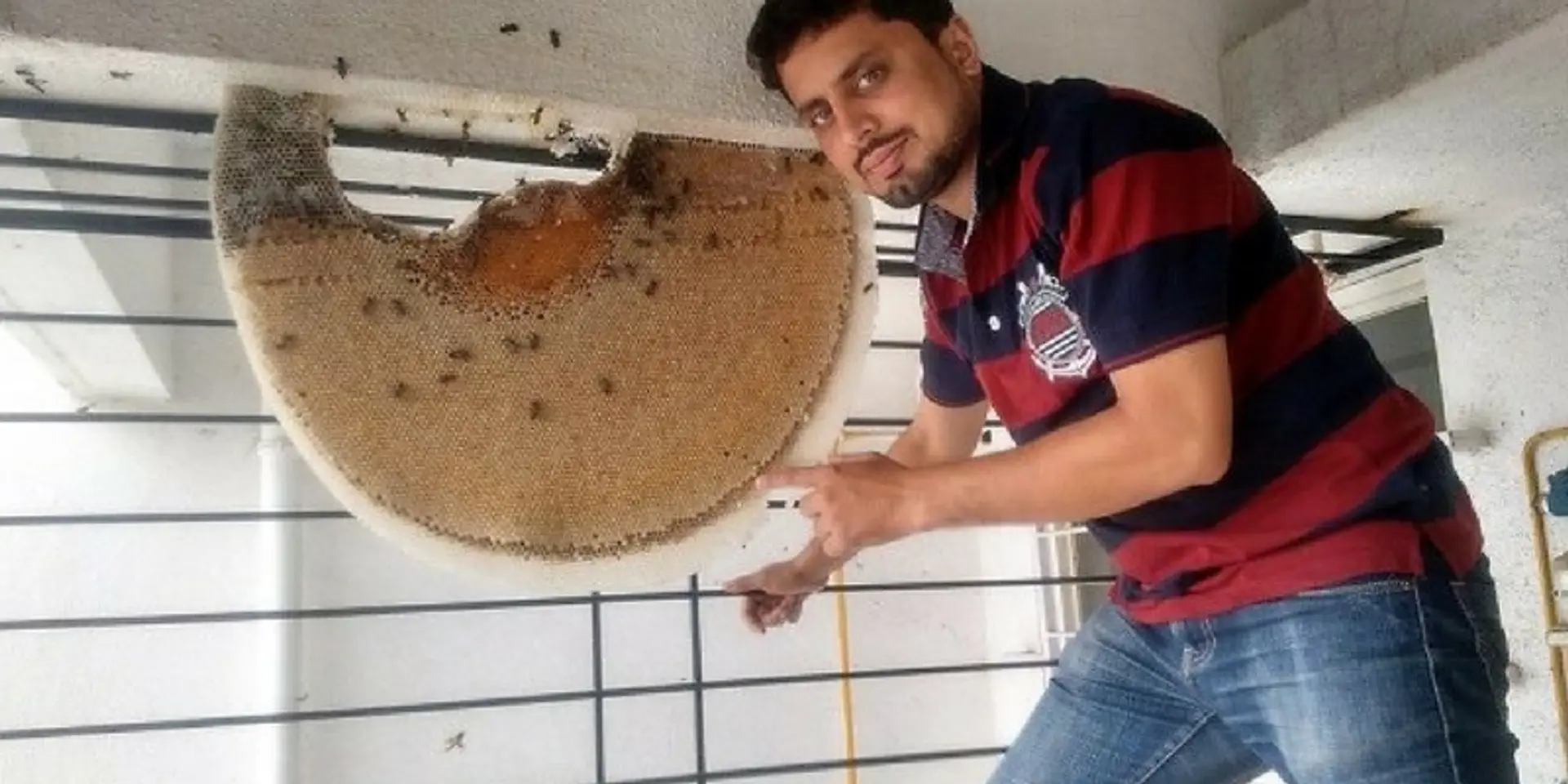This techie quit a high-paying job to conserve bees
Amit Godse is on a quest to save bees by relocating them and motivating people to keep bees for honey in their gardens.

Studies suggest that bees are disappearing at a rapid rate in India. Should we be worried? The disappearance of bees has particularly alarming implications for human existence. Honeybees play a very important role in preserving the biodiversity of nature. Bees are pollinators and many crops, vegetables, and fruit-bearing trees depend on bees to reproduce. As high as 80 percent pollination is achieved with the help of bees alone!
Pune’s tussle with bees
In growing cities such as Pune, rampant, unregulated construction activities leading to encroachment on and destruction of green cover is spelling doom for honeybees. As a result, the bees move to the cities, occupying nooks and crannies of high-rise buildings at the beginning of the spring season when they are desperate to pick nectar and form colonies.
Most of us know very little about bee behaviour. So when these bees, attracted to light, enter our houses at night, we perceive them as a threat and summon pest control to smoke them out, burning their hives and killing a large number in the process.
A young techie’s quest to save the pollinators
It was this scene that shook a young techie, Amit Godse from Pune, who left his high-paying job in 2013 to conserve bees. “I stay in a building in a residential colony in Pune and was shocked to see how a beehive was destroyed by a pest control team. I was deeply affected by what I saw and decided to do something about it,” he says.

Amit did not know anything about bees then. For the next one year, he visited a number of places like Kerala, Orissa, and Mahabaleshwar and institutes like the Central Bee Research Institute and Training Institute in Pune to learn about bees and how to handle them. He also took lessons from tribals and farmers.
He began to realise the importance of generating awareness among people so that they wouldn't fear bees and could be motivated to conserve them. As he continued exploring, he realised that it was possible to relocate bees without disturbing their colonies and also grow new bee colonies by encouraging people to do beekeeping in their gardens and terraces.
Amit took to social media to spread information about bees. He connected with environmentalists across the city and urged people to inform him when they came across a beehive in their surroundings. He also undertook awareness sessions in the city to educate people on the importance of honeybees and how we can cohabit with them.
Bees found in India
There are five types of honeybees found in India. The Apis dorsata or rock bee is the one that occupies tall trees in dense forests and lives under caves and on the roofs of high-rise buildings in urban areas. The Apis cerena indica or Indian box bee is one of the predominantly found bees in India that can be domesticated and is ideal for beekeeping.
The other types of bees include the dwarf bee or Apis florea, Apis mellifera or the western honeybee, and the dammer bees or stingless bees. Rock bees and dwarf honeybees cannot be domesticated, while the other three can be domesticated and used to procure honey.
An enterprise that sells honey
Amit started Bee Basket in 2016 to sell the honey collected during the relocation of beehives. They also help farmers and tribals by buying honey from them and selling it online. “This honey is pure and comes in different colours depending on the flowers from which the nectar is collected,” informs Amit. “Honey produced from tamarind flowers is very tasty and brown in colour while that from ajwain (carom seeds) is black. Currently, we get honey produced from wild forest, sunflowers, tulsi, and ajwain flowers."
Amit has also formed a team of six like-minded young professionals from different parts of Maharashtra who are interested in conserving bees.)
Priya Phulambrikar, one of the team members of Bee Basket, says, “I am a nature lover and I got inspired by Amit's passion for bees. I decided to join him as I think it is very important for people to know the role that bees play in nature. I learned a lot more about bees after joining this initiative and developed respect for this amazing insect. I do hope people start valuing the role that bees play in retaining the ecosystems and stop perceiving them as a threat and actively help in their survival,” she says. She also helps Amit with training programmes and writing media articles and blogs for their website to increase awareness among people.
People are gradually getting to know of Amit’s efforts and have started inviting him to participate in bee conservation and for his help in relocating bees. Amit and his team members conduct regular awareness sessions at various places like schools, colleges, corporate offices, housing societies, environment institutions, etc., provide professional service to relocate beehives, and also organise beekeeping workshops in the city.

Recently, the team has also started training tribals and farmers from villages in wild beehive handling and beekeeping to help them earn a livelihood. Apart from natural honey, Bee Basket also sells dry fruits, ginger-amla honey dip, and honey gulkand. They are also in the process of making beeswax-based products like lip balm by training tribal women to prepare these products. Apart from this, Bee Basket also supplies honeybee boxes.
Amit says anybody can keep bees in bee boxes in their gardens and balconies. “A good place to do this is near some flowering trees in the area where the bee box can be set up and bees can be encouraged to build combs. They can be given sugar syrup as food during rains or when there is no flowering available in the beginning. The super chamber and brood chamber in the bee box have vertical frames in which the bees start building combs. The upper part of the comb includes honey made by the bees and the lower portion includes eggs and the larvae. Care needs to be taken to see that the eggs and larvae are not disturbed while extracting honey,” he says.
“The bees breed and increase in number every year. The number of beehives can be increased every year, making the process sustainable. It also produces large quantities of pure honey and helps conserve and increase the bee count which will drastically improve the surrounding gardens and habitats,” says Amit.
Amit has until now supplied around 10 bee boxes in Pune, which have been placed in various societies and bungalows across the city.)
Mayur Bhave, a resident of Pune, has installed one such bee box from Amit in his garden. He says, “We used to get bees in our garden before and I saw hives being destroyed and thought of doing something about it. I came across this effort by Amit and attended one of his workshops. After learning about bees, I decided to set up a bee box in our garden. It has been a great learning experience. The box does not need much maintenance and we get honey regularly, about 1 kg every six months and that too from tamarind, Nilgiri, and jamun flowers. Bee Basket team members also visit us from time to time to help us with this.”

Amit and his team have successfully relocated 210 beehives in the last four months from different locations in Pune and the numbers keep growing. “I have also started getting calls from other cities now," he informs. “I hope to take our training courses and experience on working with bees to different parts of the state and throughout the country,” he adds.
“There are various kinds of threats to the bees such as urbanisation, destruction of green cover, use of pesticides, etc. I do hope more and more people understand and respect this amazingly resourceful insect, and contribute to the efforts to save them,” he says.
(Disclaimer: This article, authored by Aarti Kelkar-Khambete, was first published on India Water Portal)







